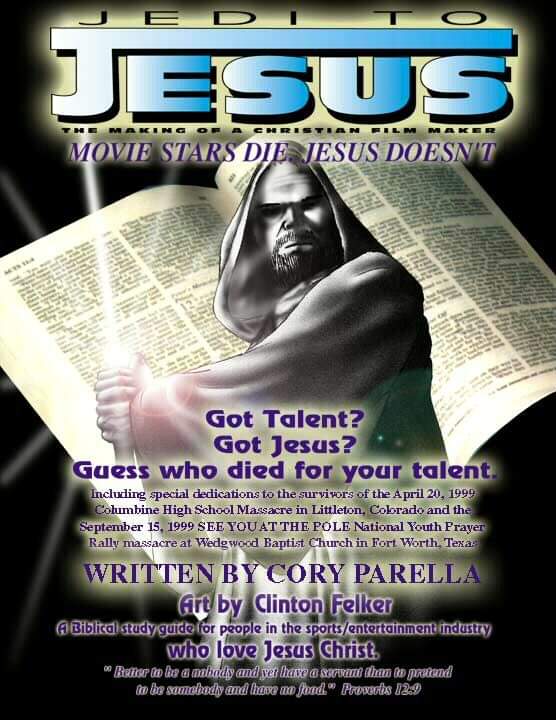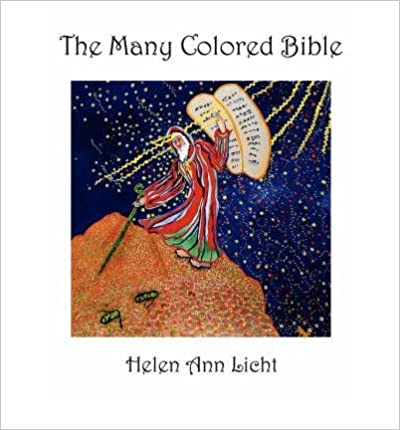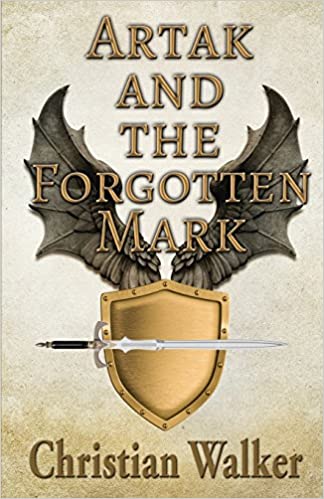Interview with Cory Parella
Author of How To Make Gospel Films People Want To See OMG! aka Jedi To Jesus:The Making of a Christian Filmmaker
Where are you from originally and where do you reside now?
I was born in Tucson,Arizona. I spent 7 years in Southern California 12 years in Colorado, and my last 2 in Nevada where I Graduated from UNLV. I have residency there.
If you currently reside somewhere besides where you were born, what’s the story that lead from there to here?
My parents drove west from New Jersey in 1972, and my mother was very pregnant with me. I was born in August of 1973 in Tucson. My personality seemed New Yorkish from the womb despite being raised in the southwest. After exhausting opportunities in Arizona in the 20th century, I went to Los Angeles and spent 7 years there. Married and had our first child. I felt a spiritual tug to Denver to reset the Christian media there, back when it was fashionable for non-Christians to bully “us”. Very victim mentality. I later formed the opinion that Believers who wanted to infuse Biblical history and idealism into media needed more protection from each other – other Christians were brutal toward one another. Meanwhile our genre was among the worst. After piracy absorbed online book profits, I went to Graduate film school and then Graduate business college in Nevada. I used Las Vegas for its Stages, again, feeling a heart tug. A professor encouraged me to keep writing what I wanted but advised me to switch genres from Christian to Family. Apparently my disdain for the Christian genre’s horrific editing and acting was shared by today’s industry leaders. I was mentored by Emmy winners.
What made you decide to write and publish your first book?
Jedi To Jesus was not my first book. I wrote several others, fiction and nonfiction. Justin Time, Witness Protection, The FAithful, and a few University of Arizona sports bios. I wanted to give the Bible inspired genre some logical dynamics. The marketing companies labeling select books as Christian Vs Other were subjectively ruling books on or out of Christian bookstores and I felt that was an unfair measurement. There was no book in existence as a litmus for the genre at the time. So, I wrote one. Columbine had happened that month and I spent a year listening to opportunitistic Christian fundamentalists blast media as the collective culprit, meanwhile it seemed to be okay for audiences to watch religious programs and donate. Double standards irk me. I also believe media makers should be licensed. When Quentin Tarantino wrote the screenplay for Natural Born Killers that resulted in a blueprint for the boys who murdered their campus rivals in 1999, I believe that even if Tarantino wasn’t convicted of negligence or wrongful death, he should have had a professional license suspended, the same with Oliver Stone who made it. Before we can discuss media licensing, we have to have measuring tools. So I wrote this. It’s imperfect but we had to start somewhere. I loathe legalism. But we had to start somewhere. I don’t agree with the Hayes Code but abandoning it didn’t help us either. I changed the title from Jedi To Jesus to its current title. An artist made the graphic based on a rough sketch I made. I did like the art. Busy, but I liked the art. One skeptic said I made a dated play on words coining a Star Wars theme. That person didn’t realize its makers would distribute up to 20 more films bearing a Star Wars name. In any case, the title is a play on words from my personal life. Star Wars was to me like a beer is to an alcoholic. I could recite the original films from memory but didn’t know the Gospel. My life was a wreck. I traded an obsession with George Lucas’ movie for a grounding in the Bible. As a result, I switched from Catholicism to Protestantism. Personal choice. My dad had switched from Protestantism to Catholicism. The title is about how I personally switched from an unhealthy obsession with Star Wars to a relationship with a real supernatural warrior. Naturally, this provokes attacks by some immature anti-Christians. I address that in the book as well. How does one handle harassment? I make suggestions.
How would you describe your books to first time readers?
I tell readers up front this book is for more grounded, more matured Believers, not the new kids in Christ. And I explain it will probably offend nonbelievers. If they continue reading, that’s on them. It was designed for Leadership, but I found most Christian Leadership already believe they know it all and have a monopoly on hearing from God, so the book’s attempt to teach reaches only those who are teachable. Most Christian pastors aren’t. Introverted narcissism is stubborn. And it’s why those who pastored churches where the boys who murdered classmates at Columbine high school – it’s why those pastors sermons fell on deaf ears. This book cannot pierce stubborness.
Who do you feel is most likely to connect with the topics you write about?
The cover art compels people to open this book. I made it for fellow film makers and… Darker personalities. It was intended to be an invitation to learn about Jesus using a Star Warsesque hook. I later observed it had an appeal of theologians and writers, mostly women – that wasn’t planned. The section I discuss sexually explicit media was so in depth, I had to remove a lot of it and put it in its own book. Since my sex education research went against the grain of the books found in Christian retailers, I put out Witness Protection as a novel first. I wanted to examine each genre objectively and let the pondering filmmaker make up their own mind.
What unexpected or surprising thing did you learn during the process of writing and publishing?
Control. To quote Obi Wan, filmmakers feel the force but cannot control it. Church leaders read my book but demanded control. Nearly every Christian pastor or lay leader I gave it to felt rattled by it because it calls out the Narcissism in the Church. I’ll also add the every church leader who banned or rejected it from being circulated is no longer active in professional ministry.
If you could, what advice would you give to past self yourself before embarking on this journey?
Take your time. No one leads another Christ by a mere book or movie. It’s relationships. I had visions of this book being credited with changes in the media I once viewed as evil. Little did I know, I wasn’t the only one approaching the issues explored and I would have focused more on the logotics side of storytelling. On the flip side, by suggesting the Christian genre needs its own amended rating system to declare what kind of idealism – which Bible edition etc was used to make a given movie, that idea was forcibly removing power from the major Christian book and music publishers and they would fight bitterly to retain their market position. We made enemies of nearly every other publisher of Christian self help. I would joke that they resembled a mafia until I learned some media-publishing churches literally had deals with the real mafia. True story.
How many people would you ideally like to reach with your books?
I once saw this title as the darling of the Oprah book club or licensed by Promise Keepers back when that meant something, but the last thing this book should become is the basis for a cult. It was meant to say we do need some accountability (licensing), more formal training (college degrees), and storytelling that respects its Source, the Bible, with superior editing and acting. We’re considered the least of the genres. And that includes Porn. When I got my first masters degree in film editing I did so motivated to help improve the quality of Christian movies. I was told point blank by many Christian movie makers that they had no intention of making better movies. They made bad films, church goers bought them out of blind obedience to pulpit advertisements, and that was that. I don’t agree with that so I switched genres.
What has been the biggest challenge and frustration during the process to date?
Distribution and piracy. Apparently it’s the file sharing world’s right to read my book without paying for it. Also, few churches would buy it unless I wrote the word pastor under the byline. I wouldn’t lie so they didn’t buy.
What’s your biggest strengths when it comes to book a) writing, b) publishing and c) marketing?
After being shut out of Christian retailers, I learned from earning a masters degree in business management that I needed more money to access my readers as the 20th century retailers that rejected the book went bankrupt one by one. Market saturation is the toughest battle. Just making the reader aware of the title. Then, you never know what the browser is seeking. One reader gave us a 1-star review because we wouldn’t fund her movie. Others wouldn’t stock it because the book size was too large. This is the learning curve of marketing. This book came out years before the iPad. First we couldn’t get it into book stores for the oddest reasons, then we couldn’t get paid for illegal downloads.
What’s your biggest weakness when it comes to book a) writing, b) publishing and c) marketing?
I believe the cover’s too busy. The message is delivered as a blend of memoir and instructional guide. Remember, there’s no professional licensing required to make media so all of this is Opinion.
When do you think you will you write your next book?
After 20+ books including 3 written with actor-director Kevin Sorbo, I’m switching to acting. In Grad school I developed an Act called Cory Parella The Storytella. Vaudeville rebooted. It’s on YouTube.
I do want to write another Justin Time sequel. My books are best experienced as movies, so I’m focusing on being a famous enough actor to attract the funding. Like Tolkien, I didn’t write cheap. My worlds will take. Money to make.
Are you self published or did you use a hybrid publisher, or a traditional publisher?
Loaded question. Every publisher is a self publisher. The traditional 19th century companies saw the profits gained by some aggregators and adjusted their business models to adapt to a quickly expanding digital media jungle. I learned the template system and how each database required different spec dimensions. Little did I know how powerful this made my newfound publishing company because now I didn’t need the bigger brands. I also learned how they achieved “national best Seller” status so quickly. They bought titles from themselves using shell companies. Deceptive, but that’s how most of the NY Times Best Sellers list gets there, with few exceptions.
FEATURED AUTHORS
Worrying if I was telling too many secrets Leaving out so much.
Keep Reading »Writing is an arduous task even when one has all ideas clear in the read more
Keep Reading »Write the book, start marketing (letting people know of it) before you finish.
Keep Reading »










